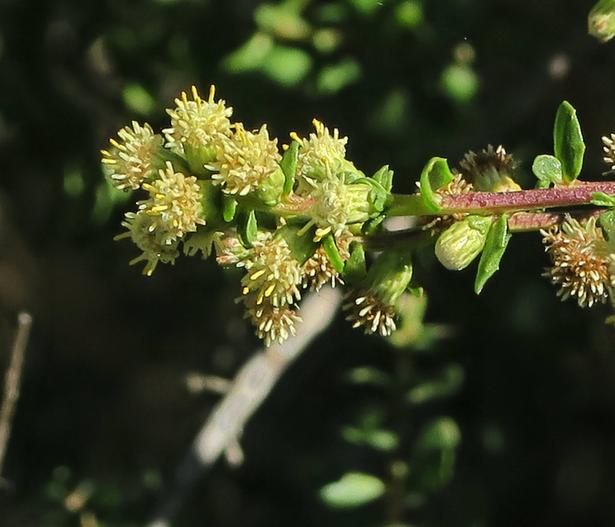Coyote Brush
(Baccharis pilularis subsp. consanguinea)
Coyote Brush (Baccharis pilularis subsp. consanguinea)
/
/

John Rusk
CC BY 2.0
Image By:
John Rusk
Recorded By:
Copyright:
CC BY 2.0
Copyright Notice:
Photo by: John Rusk | License Type: CC BY 2.0 | License URL: https://creativecommons.org/licenses/by/2.0/ | Uploader: John Rusk | Publisher: Flickr
























Estimated Native Range
Summary
Baccharis pilularis subsp. consanguinea, commonly known as Coyote Brush or Chaparral Broom, is an evergreen shrub native to California and Oregon, particularly thriving in coastal bluffs, chaparral, and open woodlands. It exhibits a rapid growth rate, reaching heights of 1.5-10 feet (0.46-3 meters) and widths of 4-6 feet (1.2-1.8 meters). The plant forms a dense, mounding shape with fine-textured foliage. Its flowers, which appear from late summer to fall, are small and may be white or yellowish, with male and female flowers on separate plants. The flowers are not particularly showy but are attractive to pollinators such as bees and butterflies.
Coyote Brush is valued for its drought tolerance and ability to stabilize soil, making it an excellent choice for erosion control on slopes and disturbed areas. It is also used for habitat restoration and as a low-maintenance ground cover in xeriscaping. In cultivation, it requires minimal care, thriving in full sun to part shade and tolerating a range of soil types, from clay to sandy loam, provided they have medium to fast drainage. While it is drought-tolerant once established, occasional watering during prolonged dry periods can keep it looking its best. Coyote Brush can be pruned to maintain a desired shape or to rejuvenate older plants.CC BY-SA 4.0
Coyote Brush is valued for its drought tolerance and ability to stabilize soil, making it an excellent choice for erosion control on slopes and disturbed areas. It is also used for habitat restoration and as a low-maintenance ground cover in xeriscaping. In cultivation, it requires minimal care, thriving in full sun to part shade and tolerating a range of soil types, from clay to sandy loam, provided they have medium to fast drainage. While it is drought-tolerant once established, occasional watering during prolonged dry periods can keep it looking its best. Coyote Brush can be pruned to maintain a desired shape or to rejuvenate older plants.CC BY-SA 4.0
Plant Description
- Plant Type: Shrub
- Height: 1.5-10 feet
- Width: 4-6 feet
- Growth Rate: Rapid
- Flower Color: White, Green
- Flowering Season: Fall
- Leaf Retention: Evergreen
Growth Requirements
- Sun: Full Sun, Part Shade
- Water: Low, Medium
- Drainage: Medium, Fast
Common Uses
Bee Garden, Deer Resistant, Drought Tolerant, Erosion Control, Groundcover, Hedges, Low Maintenance, Street Planting
Natural Habitat
Native to California and Oregon, particularly coastal bluffs, chaparral, and open woodlands
Other Names
Common Names: Chaparral Broom
Scientific Names: , Baccharis pilularis subsp. consanguinea, Baccharis congesta, Baccharis consanguinea, Baccharis pilularis var. consanguinea,
GBIF Accepted Name: